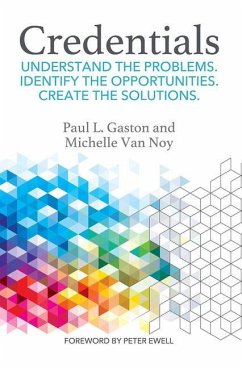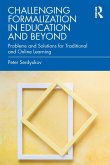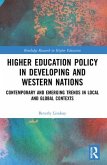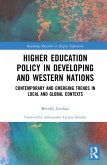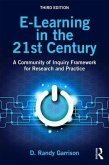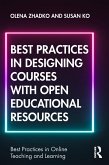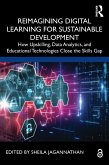The credentials environment grows more complicated by the day, but key questions help us understand why we need this book to help us grapple with those complexities: - Given the expansion in the variety of higher education credentials and in approaches to earning them, why are so many students disappointed with their post-secondary credentials?- Despite the proliferation of credentials tailored to specific careers, why do so many employers complain that the preparation of their new hires is inadequate? - Despite their investment in new programs meant to attract new enrollees, why are so many colleges and universities facing issues with student persistence, timely credential completion, and career success?The plan of the book reflects the authors' practical aim. In the first of three parts, they offer a broad view of the credentials environment-how credentials work, how a proliferation in credentials has created an unprecedented array of educational choices, and why this abundance is a mixed blessing. In the second part, they focus on categories of credentials, from the associate degree to doctoral degrees to non-degree credentials. The book concludes with two chapters that consider the implications of the information the authors provide for leadership in volatile times: one discusses the importance of maintaining a priority on equity; the other offers 12 propositions for action. To help make the book useful, each chapter begins with a paragraph that summarizes the emphases to follow, and ends with a list of initiatives, i.e., "takeaways," that leaders (and those attentive to what leaders are doing) should consider.
"When trying to understand, let alone navigate, a landscape as chaotic and confusing as America's credential ecosystem, a guidebook from trusted experts is essential. This is that-the resource you'll want to read and reread to ensure you have a firm foundation for the journey."
Scott Cheney
CEO, Credential Engine
"A future-focused analysis of credentials and credentialism doesn't get any more timely than this. This is a must read for higher education leaders today, but it may prove even more important for future leaders interested in an equitable and sustainable future of work and learning."
Parminder K. Jassal
CEO, Unmudl Skills-to-Jobs Marketplace
"Given the accelerating rate of change in the workplace, credentials have become an even more essential tool to ensure the relevance of skills. The authors' overview of the credentials landscape should help readers understand more fully the complex factors at work in how they are used by employers and educators."
Van Ton-Quinlivan
CEO, Futuro Health; Former Executive Vice Chancellor, California Community Colleges
"Paul Gaston and Michelle Van Noy tour the burgeoning credentials landscape from traditional degrees to emerging and unfamiliar new credentials and through non-degree credentials to apprenticeships, describing their characteristics and considering their applicability and quality. In doing so, they provide a very helpful introduction and analysis of an increasingly complex field."
Peter Ewell
President Emeritus, National Center for Higher Education Management Systems
"Credentials does a wonderful job of laying the framework of why credentials are important to an advanced society focusing on educating the workforce and building the economy. By looking back as a way to look forward, Paul Gaston and Michele Van Noy
document the importance of well-defined credentials while suggesting what the competency-based credentials of the future will look like. What I like the most is how they advocate for quality and equity both within each credential and in the transitions made among credentials."
Aaron Thompson
President, Kentucky Council on Postsecondary Education
"Credentials are fundamental to employment and opportunity, but also to personal identity. They are of interest to educators, employers, and policy makers. Yet despite their ubiquity and significance they are poorly understood; even more so every day as the number and type of credentials have exploded in the last two decades. Gaston and Van Noy provide an excellent framework to help navigate this proliferation. They plot an insightful way forward for college and university administrators, faculty members, academic advisors and others as they design academic programs (and associated credentials) and help guide students to use credentials to achieve their goals.
Thomas Bailey
President, Teachers College, Columbia University
"The importance of this book is reflected in continuing calls for attention to quality and equity in education at all levels within postsecondary education. With government at both the state and national level as well as other stake-holders seeking increased accountability through accreditation, this readable book could not be more timely."
Leah Matthews
Executive Director, Distance Education Accrediting Commission
Scott Cheney
CEO, Credential Engine
"A future-focused analysis of credentials and credentialism doesn't get any more timely than this. This is a must read for higher education leaders today, but it may prove even more important for future leaders interested in an equitable and sustainable future of work and learning."
Parminder K. Jassal
CEO, Unmudl Skills-to-Jobs Marketplace
"Given the accelerating rate of change in the workplace, credentials have become an even more essential tool to ensure the relevance of skills. The authors' overview of the credentials landscape should help readers understand more fully the complex factors at work in how they are used by employers and educators."
Van Ton-Quinlivan
CEO, Futuro Health; Former Executive Vice Chancellor, California Community Colleges
"Paul Gaston and Michelle Van Noy tour the burgeoning credentials landscape from traditional degrees to emerging and unfamiliar new credentials and through non-degree credentials to apprenticeships, describing their characteristics and considering their applicability and quality. In doing so, they provide a very helpful introduction and analysis of an increasingly complex field."
Peter Ewell
President Emeritus, National Center for Higher Education Management Systems
"Credentials does a wonderful job of laying the framework of why credentials are important to an advanced society focusing on educating the workforce and building the economy. By looking back as a way to look forward, Paul Gaston and Michele Van Noy
document the importance of well-defined credentials while suggesting what the competency-based credentials of the future will look like. What I like the most is how they advocate for quality and equity both within each credential and in the transitions made among credentials."
Aaron Thompson
President, Kentucky Council on Postsecondary Education
"Credentials are fundamental to employment and opportunity, but also to personal identity. They are of interest to educators, employers, and policy makers. Yet despite their ubiquity and significance they are poorly understood; even more so every day as the number and type of credentials have exploded in the last two decades. Gaston and Van Noy provide an excellent framework to help navigate this proliferation. They plot an insightful way forward for college and university administrators, faculty members, academic advisors and others as they design academic programs (and associated credentials) and help guide students to use credentials to achieve their goals.
Thomas Bailey
President, Teachers College, Columbia University
"The importance of this book is reflected in continuing calls for attention to quality and equity in education at all levels within postsecondary education. With government at both the state and national level as well as other stake-holders seeking increased accountability through accreditation, this readable book could not be more timely."
Leah Matthews
Executive Director, Distance Education Accrediting Commission

